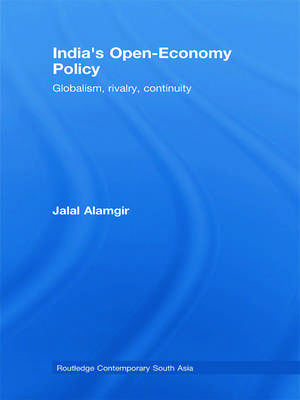India's Open-Economy Policy: Globalism, Rivalry, Continuity: Routledge Contemporary South Asia Series
Autor Jalal Alamgiren Limba Engleză Hardback – 7 noi 2008
Drawing on a wide range of contemporary and historical sources, and going as far back as the 19th century, the author reconstructs how Indian policymakers have interpreted economic priorities, perceived success and failure, and evaluated the destiny of their nation. By the 1990s, their imperatives increasingly highlighted a sense of rivalry, especially with China, and globalism, a desire to play a strong role in world affairs. The book shows how a sense of nationalist urgency was created through globalism and rivalry, allowing policymakers to privilege international needs over domestic political demands, replace economic independence with interdependence as a priority, and ensure that the broad basis of India’s openness could not be challenged effectively even though certain policies faced severe opposition.
This book will be of interest to those working on International Political Economy, Globalization, Economic History, Public Policy, and South Asian politics.
| Toate formatele și edițiile | Preț | Express |
|---|---|---|
| Paperback (1) | 485.32 lei 6-8 săpt. | |
| Taylor & Francis – 8 apr 2010 | 485.32 lei 6-8 săpt. | |
| Hardback (1) | 372.58 lei 6-8 săpt. | |
| Taylor & Francis – 7 noi 2008 | 372.58 lei 6-8 săpt. |
Din seria Routledge Contemporary South Asia Series
-
 Preț: 393.91 lei
Preț: 393.91 lei -
 Preț: 310.08 lei
Preț: 310.08 lei - 8%
 Preț: 389.84 lei
Preț: 389.84 lei -
 Preț: 304.19 lei
Preț: 304.19 lei -
 Preț: 316.71 lei
Preț: 316.71 lei -
 Preț: 328.88 lei
Preț: 328.88 lei -
 Preț: 349.03 lei
Preț: 349.03 lei - 9%
 Preț: 1035.78 lei
Preț: 1035.78 lei - 18%
 Preț: 1056.00 lei
Preț: 1056.00 lei - 28%
 Preț: 848.40 lei
Preț: 848.40 lei - 18%
 Preț: 1059.48 lei
Preț: 1059.48 lei - 18%
 Preț: 1063.41 lei
Preț: 1063.41 lei - 18%
 Preț: 1060.87 lei
Preț: 1060.87 lei - 18%
 Preț: 1057.26 lei
Preț: 1057.26 lei - 18%
 Preț: 1057.75 lei
Preț: 1057.75 lei - 18%
 Preț: 1061.93 lei
Preț: 1061.93 lei - 18%
 Preț: 1057.05 lei
Preț: 1057.05 lei - 18%
 Preț: 1062.98 lei
Preț: 1062.98 lei - 18%
 Preț: 1049.21 lei
Preț: 1049.21 lei - 18%
 Preț: 1058.79 lei
Preț: 1058.79 lei - 18%
 Preț: 1057.09 lei
Preț: 1057.09 lei - 18%
 Preț: 705.87 lei
Preț: 705.87 lei - 18%
 Preț: 1054.97 lei
Preț: 1054.97 lei - 18%
 Preț: 1109.42 lei
Preț: 1109.42 lei - 28%
 Preț: 823.63 lei
Preț: 823.63 lei - 18%
 Preț: 1169.78 lei
Preț: 1169.78 lei - 30%
 Preț: 846.42 lei
Preț: 846.42 lei - 18%
 Preț: 1054.71 lei
Preț: 1054.71 lei - 18%
 Preț: 1057.75 lei
Preț: 1057.75 lei - 18%
 Preț: 1062.98 lei
Preț: 1062.98 lei - 28%
 Preț: 822.36 lei
Preț: 822.36 lei - 28%
 Preț: 848.15 lei
Preț: 848.15 lei - 18%
 Preț: 1053.92 lei
Preț: 1053.92 lei - 18%
 Preț: 698.58 lei
Preț: 698.58 lei - 18%
 Preț: 1058.79 lei
Preț: 1058.79 lei - 18%
 Preț: 1062.98 lei
Preț: 1062.98 lei - 18%
 Preț: 1057.75 lei
Preț: 1057.75 lei - 18%
 Preț: 1060.87 lei
Preț: 1060.87 lei - 18%
 Preț: 1057.40 lei
Preț: 1057.40 lei - 18%
 Preț: 1057.13 lei
Preț: 1057.13 lei - 18%
 Preț: 1165.87 lei
Preț: 1165.87 lei - 28%
 Preț: 823.63 lei
Preț: 823.63 lei - 18%
 Preț: 1059.48 lei
Preț: 1059.48 lei -
 Preț: 378.43 lei
Preț: 378.43 lei - 18%
 Preț: 1055.51 lei
Preț: 1055.51 lei - 18%
 Preț: 1057.75 lei
Preț: 1057.75 lei - 18%
 Preț: 1227.38 lei
Preț: 1227.38 lei - 28%
 Preț: 850.37 lei
Preț: 850.37 lei - 18%
 Preț: 1166.01 lei
Preț: 1166.01 lei
Preț: 372.58 lei
Nou
Puncte Express: 559
Preț estimativ în valută:
71.29€ • 77.68$ • 60.07£
71.29€ • 77.68$ • 60.07£
Carte tipărită la comandă
Livrare economică 23 aprilie-07 mai
Preluare comenzi: 021 569.72.76
Specificații
ISBN-13: 9780415776844
ISBN-10: 0415776848
Pagini: 192
Ilustrații: 10 b/w images, 12 tables and 10 line drawings
Dimensiuni: 156 x 234 x 15 mm
Greutate: 0.52 kg
Ediția:1
Editura: Taylor & Francis
Colecția Routledge
Seria Routledge Contemporary South Asia Series
Locul publicării:Oxford, United Kingdom
ISBN-10: 0415776848
Pagini: 192
Ilustrații: 10 b/w images, 12 tables and 10 line drawings
Dimensiuni: 156 x 234 x 15 mm
Greutate: 0.52 kg
Ediția:1
Editura: Taylor & Francis
Colecția Routledge
Seria Routledge Contemporary South Asia Series
Locul publicării:Oxford, United Kingdom
Public țintă
PostgraduateCuprins
Preface 1. Explaining the Continuity of Openness 2. The Politics of Causes and Consequences 3. Roots of Globalism and Rivalry 4. Evolution of Economic Globalism and Economic Rivalry 5. Perception, Policy, and Persistence. Appendix
Notă biografică
The late Jalal Alamgir was Assistant Professor of Political Science at the University of Massachusetts, Boston, specializing in the relationships between globalization and representational politics.
Descriere
This book explains the continuity of economic openness using India as a case study. Arguing that open-economy policies in India were made, justified, and continued on the basis of the idea of openness much more than its tangible effect, it explains what sustained the idea of openness, what philosophy, interpretations of history, and types of rhetoric gave it support, justification, and persuasive force.



















